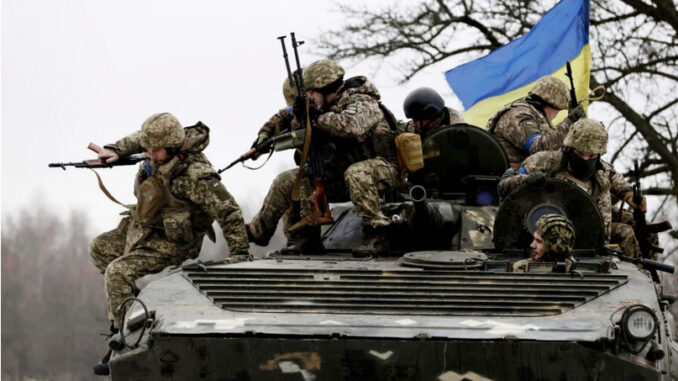
When up to 190,000 Russian soldiers invaded Ukraine last February, even its most ardent foreign supporters expected the nation’s far more limited defenses would collapse within days.
But one year later, Russia has lost a reported 200,000 men, including many high-ranking military officials, and President Vladimir Putin has been embarrassed by the Ukrainian Army’s successes and the resilience of Ukraine’s many citizen militias.
A group of historians, military and intelligence experts, and cultural and political analysts, looked back at how the war has played out thus far and considered where events may be headed during a colloquium Wednesday hosted by the Belfer Center’s Intelligence Project and Russia Matters at Harvard Kennedy School.
Fiona Hill, A.M. ’91, Ph.D. ’98, who served as senior director for European and Russian Affairs at the National Security Council from 2017 to 2019, said the U.S. and the West are “still stuck” in a historical narrative about Ukraine created by Putin. The Russian leader has framed the conflict as an existential threat to his nation and has taken to calling it “The Third Great Patriotic War,” a reference to the Napoleonic invasions of Russia in the 1800s and the Nazi German invasions in the 1940s.
“He wants a recognition by the rest of Europe that Russia has its own sphere of influence, and actually has a right to claim additional sets of territory,” said Hill, now a senior fellow at the Brookings Institution. It’s a view many in Russia share, not just the president, she added.
American foreign policy starting in the 1990s has played a role in Russia’s misperceptions, Hill argued. The U.S. set the conflict in motion by the way it viewed the dissolution of the Soviet Union, formally recognizing some countries, like Russia, as successor states, but not others, like Ukraine, leaving them in a geopolitical gray zone.
Both countries have suffered major economic declines since the war. Forty percent of Ukraine’s physical infrastructure has been destroyed while gross domestic product (GDP) fell by 33 percent. Russia’s Finance Ministry reports annual revenue fell 35 percent in 2022 while spending rose 59 percent.
But the many banking and trade sanctions imposed by the U.S. and Europe early on have done little to hurt Russia’s ability to wage war and thanks to cooperation from allies like China, India, and Iran, Russian consumers have not felt a significant pinch to their quality of life, said Alexandra Vacroux, executive director of the Davis Center for Russian and Eurasian Studies at Harvard.
That doesn’t mean Russia is doing well. Its economy was already battered before the conflict, so squeezing it further only makes life marginally more difficult for ordinary civilians, less so for the Kremlin. “The only way to keep Russia from fighting or winning this war is to give the Ukrainians military support,” she said.
Retired U.S. Army Lt. Gen. Mark Hertling said the biggest challenge for the Ukrainian army will be quickly integrating all the different weapon systems they’re getting from Western allies.
“The spring will be a race between Russian mobilization and the transformation of Ukraine’s army,” Hertling said. “Mr. Putin, I think, has made an active decision to mobilize forces to the front lines, getting as many bodies into this [in an] to attempt to retake ground” and gain additional leverage to lure Ukraine into any future negotiations.
In the coming weeks, Hertling expects that Russia will likely increase missile attacks and its air and naval forces will continue to strike against Ukraine’s infrastructure. Military exercises in Belarus are a ruse and not evidence that nation’s forces will take up arms against Ukraine, but Russian forces may use Belarus as an entry point, he said.
Putin’s agenda, to wipe out Ukraine as a state and Ukrainians as a people, is longstanding and deeply held in Russian society and by the nation’s power brokers. It will “most certainly outlast” the Putin regime and won’t be curtailed by current battlefield setbacks, said Nataliya Bugayova M.P.P. ’12, a Ukrainian national security analyst.
“All the conversation about cease-fires, premature peace deals, and negotiations — they’re not off-ramps for the Kremlin. They are delayed on-ramps to pursue the same objectives, just under better circumstances,” she said.
Whether the war will end in 2023 is not yet clear, but “it’s potentially a decisive year,” said Rolf Mowatt-Larssen, former nuclear counterterrorism officer for the CIA and now a senior fellow at the Belfer Center.
The conflict has been “a disaster” for both countries, especially Russia, he noted.
“The ways that Russia has been damaged by this strategically far outweigh what [it] may gain in Ukraine, even if [it] prevails to some extent on the battlefield,” he said.
The things Putin feared most were Ukraine drifting closer toward the EU and a stronger, more unified NATO, and both have to come to pass — and then some.
“Any threat [Putin] thought NATO could have presented to Russia he has far exceeded in damaging his own interests for a military threat that NATO never posed.”
Mowatt-Larssen’s “greatest concern” is that at some point in the next year, Putin will decide that his army is no longer capable of taking back what he views as Russian territories.
“That is a condition where I think Vladimir Putin will use tactical nuclear weapons,” he said, and why the U.S. must start thinking now about whether Russia can be deterred and how the U.S. will respond if Russia deploys them or causes some other mass casualty disaster.



Be the first to comment